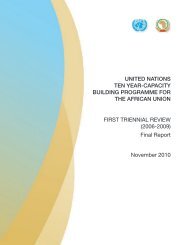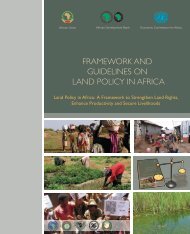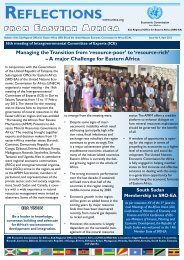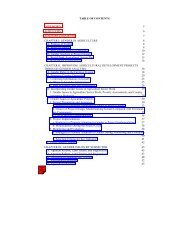A Decade of NEPAD - Economic Commission for Africa - uneca
A Decade of NEPAD - Economic Commission for Africa - uneca
A Decade of NEPAD - Economic Commission for Africa - uneca
You also want an ePaper? Increase the reach of your titles
YUMPU automatically turns print PDFs into web optimized ePapers that Google loves.
than 100 companies and representing about 80% <strong>of</strong> all<br />
French firms invested or operating in <strong>Africa</strong>.<br />
ӹ Corporate Council on <strong>Africa</strong> (CCA) – The CCA is the<br />
leading US private sector organisation representing<br />
US business interests in <strong>Africa</strong> <strong>for</strong>med in 1992 with<br />
approximately 180 US corporate members. CCA is<br />
involved in promoting investment and trade opportunities<br />
in <strong>Africa</strong> and liaising with the U administration<br />
on policy matters on <strong>Africa</strong>.<br />
ӹ The British <strong>Africa</strong> Business Association (BABA)<br />
– The BABA was founded in 1995, and is a federal<br />
grouping <strong>of</strong> three major business associations<br />
in UK whose main focus is to facilitate investment<br />
and trade with sub-Saharan <strong>Africa</strong> via:<br />
The Eastern <strong>Africa</strong> Association (EAA), The Southern <strong>Africa</strong><br />
Business Association (SABA) and The West <strong>Africa</strong><br />
Business Association (WABA). The objective <strong>of</strong> BABA<br />
is to facilitate co-operation between the three member<br />
organisations and act on their behalf on matters <strong>of</strong><br />
common interest as appropriate in London, Brussels,<br />
Washington and in <strong>Africa</strong>.<br />
ӹ The International Business Leaders Forum (IBLF) – The<br />
Forum works strategically with business, civil society<br />
and the public sector in transition and emerging<br />
economies in order to achieve socially, economically<br />
and environmentally sustainable development.<br />
ӹ The Business Council Europe <strong>Africa</strong> Mediterranean<br />
(BCEAM) –Through its members organizations,<br />
BCEAM represents some 1,500 European Union companies<br />
with interests in the <strong>Africa</strong>n continent, from the<br />
Mahgreb to South <strong>Africa</strong>, and represents over 3,000,000<br />
employees. The activities <strong>of</strong> BCEAMs member companies<br />
cover the complete range <strong>of</strong> commerce and industry,<br />
including, agriculture, mining, transport, banking<br />
and the service sectors. At present BCEAM groups all<br />
existing EU employers’ Associations <strong>of</strong> the private sector<br />
that specialise in developing economic relationships<br />
with <strong>Africa</strong>n countries.<br />
ӹ The Pan-<strong>Africa</strong>n Employers Confederation (PEC) – PEC<br />
is the grouping <strong>of</strong> all employers associations across<br />
<strong>Africa</strong> with representation in 39 countries on the continent.<br />
As the regional representative <strong>of</strong> the international<br />
organisation <strong>of</strong> employers network, it works closely<br />
with over 135 national employers’ organisations from<br />
131 countries.<br />
ӹ The Canadian Council on <strong>Africa</strong> (CCoA) – The Canadian<br />
Council was founded in May 2002. The Canadian<br />
Council represents the Canadian private sector and<br />
4. <strong>NEPAD</strong> and the <strong>Africa</strong>n Private Sector Today A <strong>Decade</strong> <strong>of</strong> <strong>NEPAD</strong><br />
engages with the Canadian government on <strong>Africa</strong> trade,<br />
investment and development issues.<br />
While the <strong>NEPAD</strong> Business Group, as a collective, has<br />
not to date initiated many programmes, the individual<br />
members in their own capacities have continued to focus<br />
on facilitating trade and investment with <strong>Africa</strong> on behalf<br />
<strong>of</strong> their constituents and have indeed promoted <strong>NEPAD</strong><br />
(particularly the STAP projects) as a vehicle through which<br />
their members can engage with <strong>Africa</strong>n business and government<br />
partners <strong>for</strong> mutually beneficial gain.<br />
Also, in addition to the various chambers <strong>of</strong> commerce<br />
and sector and pr<strong>of</strong>essional associations and organizations<br />
mentioned above, including the original <strong>NEPAD</strong> Group,<br />
in a handful <strong>of</strong> <strong>Africa</strong>n countries there are also <strong>NEPAD</strong><br />
specific business entities:<br />
ӹ <strong>NEPAD</strong> Business Foundation – South <strong>Africa</strong><br />
ӹ <strong>NEPAD</strong> Business Group – Nigeria<br />
ӹ <strong>NEPAD</strong> Business Group – Cote d’Ivoire<br />
ӹ <strong>NEPAD</strong> Business Group – Benin<br />
In terms <strong>of</strong> assessing the progress that has been made in<br />
incorporating the <strong>Africa</strong>n private sector into the activity<br />
<strong>of</strong> <strong>NEPAD</strong>, nearly since the inception <strong>of</strong> the initiative<br />
there have been annual dialogues held in various regions<br />
across <strong>Africa</strong> and outside <strong>of</strong> <strong>Africa</strong> about how the <strong>Africa</strong>n<br />
private sector can engage in the <strong>NEPAD</strong> implementation<br />
programme 63 .<br />
Continuously the findings have been that the <strong>Africa</strong>n<br />
private sector, individually as enterprises, and collectively<br />
through organized business bodies (chambers and sector/<br />
pr<strong>of</strong>essional organs) is not that well in<strong>for</strong>med about<br />
<strong>NEPAD</strong>, generally, nor about <strong>NEPAD</strong> projects, initiatives<br />
and related business and engagement opportunities, more<br />
specifically.<br />
National <strong>NEPAD</strong> “focal points” in most countries have<br />
<strong>of</strong>ten been sorely under-resourced and there have been<br />
few institutionalized mechanisms <strong>for</strong> engagement and<br />
communication facilitation between AU member states<br />
and their private sectors.<br />
The regional nature <strong>of</strong> <strong>NEPAD</strong> projects and the predominantly<br />
domestic focus <strong>of</strong> the majority <strong>of</strong> <strong>Africa</strong>n private<br />
63 See page 6<br />
51







